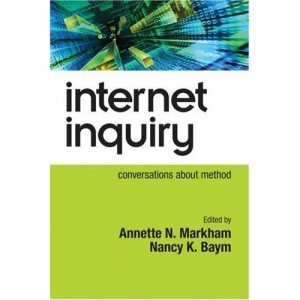Wednesday, July 23, 2008

I got my hard copies of my new book Fed Ex today, and it’s being offered at 2/3 the regular price at Amazon so if you’ve been waiting to order it, now’s the time! Besides Annette and me, the authors include (in order of appearance):
- Christine Hine
- Lori Kendall
- danah boyd
- Ramesh Srinivasan
- Elaine Lally
- Jenny Sundén
- John Campbell
- Shani Orgad
- Maria Bakardjieva
- Radhika Gajjala
- Malin Sveningsson
- Elizabeth Buchanan
- Susannah Stern
Thursday, July 17, 2008
Along with Radiohead (though in fact far beyond them), Trent Reznor is often held up as one of the heroes of new media music promotion. This raises the usual litany of questions: Could this work for a new band without a huge following? Is this unique to him? Is this THE FUTURE? Blah blah blah?
Would what he does work for others? Well, no, not exactly. But what he does has got some lessons in it that would if you forget the specifics and focus on the concepts. Here are three things he’s got down:
(1) He intertwines the online and the offline instead of focusing on one or the other. Past promotions have included USB sticks left in restrooms with songs he knew would be uploaded and peer-distributed and t-shirts with hidden URLs where devotees could find clues to forthcoming releases. His current schtick incorporates Google Earth to lead inquisitive fans to tickets hidden in places like drainpipes.
(2) He knows that fans experience music together and all of these strategies are designed to make fans talk to each other and do things together. Emotion is contagious and sharing these experiences makes them more exciting than they are alone. Just think about how much more you laugh aloud when you watch something funny with others.
(3) He intertwines the feelings evoked by his music with those evoked by these strategies. In the blog linked above, Mark Milian summarizes the feelings he and his friends had when they found the tickets:
As we jumped up and down, celebrating our victory, it was obvious that Reznor had accomplished his goal. Those feelings of excitement and anxiety are the same emotions he aims to put across in his music. And that could explain why fans have been so overwhelmingly receptive to such a bizarre spin on one of the oldest forms of music promotion — a ticket giveaway.
The next band to hide USB sticks in bathrooms, put codes on t-shirts, or use Google Earth to point the way to hidden tickets will be rightly seen as copycats. But the next band to figure out how to take the experience evoked by their sound and find its counterpart in a social collaboration that fans can engage online and off will be rightly hailed as brilliant.
Monday, July 14, 2008
One of the most read posts I ever wrote was this one about sneaker fan efforts to get Nike to manufacture the McFly seen in Back to the Future II.
They got their wish. Kind of:
…the guys that run the McFly 2015 Project, a grassroots movement that has been trying to drum up support for Nike to make this shoe aren’t satisfied.
“The Nike Hyperdunks might be inspired by the McFly 2015’s, but the Nike Hyperdunks are not the McFly 2015’s” said Michael Maloof, who with his brother Charles launched a Web site last year in order to push for the futuristic sneakers. “We strongly encourage each and everyone who wants the ‘real’ McFly 2015’s to sign up on the official McFly 2015 project Web site.”
Sure enough, they don’t really look THAT much like the McFlys and, perhaps most importantly, they are not automagically self-lacing.
Real:

Imitation:

But it does look like someone at Nike is listening to the fans.
Wednesday, July 2, 2008
One of the hardest things about coming to terms with online fan bases is being ok with their criticism. I think all of us have a strong desire to only have nice things said about us. Trying to shut down voices that disagree can be a very understandable knee jerk reaction.
So it was interesting this week to see how Barack Obama, or at least his spokesperson, responded to the fact that people are using his own site to protest his turnaround on the FISA legislation by forming a protest group. According to The Wall Street Joural:
Membership in the online group grew tenfold over the weekend and boasted more than 9,000 members by Tuesday. The group’s sudden popularity suggests the vocalness of the grass-roots Internet community and raises questions about how Sen. Obama will handle dissenting voices from within the online movement he has harnessed to great success.
What are the obvious responses? Shut them down. Kick them off the site.
What is the official response?
Obama spokesman Tommy Vietor said in a statement: “We believe that an open dialogue is an important part of any campaign, and are happy that my.BarackObama.com has become a vehicle for that conversation.”
Whatever you think about FISA or Obama, this is the right way to handle dissent, whether it’s disagreement with your politics, disapproval of your new album, dislike of your team’s recruiting…



